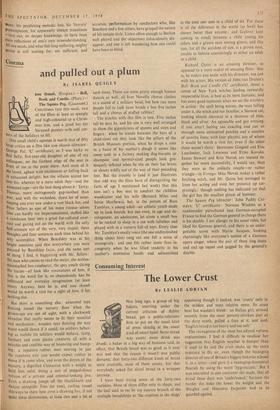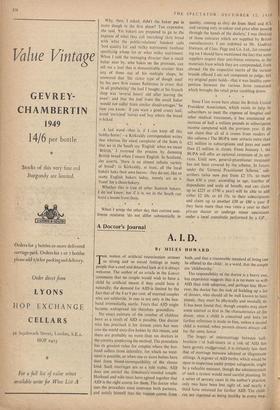Consuming Interest
The Lower Crust
By LESLIE ADRIAN I have been trying some of the forty-two varieties. Most of them differ only in shape, and the loaf sold to me by my nearest branch of the multiple breadshops as 'the crustiest in the shop,' appetising though it looked, was 'crusty' only in the mildest and most relative sense. Its crust bent but wouldn't break : an Italian girl, arrived recently from the most poverty-stricken part of the deep south, pulled a face at it, and iaid, 'English bread is too heavy and too soft.'
The manageress of the shop has offered various explanations. I find it difficult to swallow her suggestion that English weather is damper than it used to be and the crust soaks up the extra moisture in the air, even though the managing director of one of Britain's biggest bakeries echoed it, in a letter—and gave it a managing-directorial flourish by using the word 'hygroscopic.' But I was interested in one comment she made, that all bread these days was 'underbaked,' because the harder the bake the lower the weight and the Weights and .Measures Inspector had to be guarded against. Why, thert I asked, didn't the baker put in more dough in the first place? Too expensive, she said. Yet bakers are prepared to go to the expense of what they call 'enriching' their bread with what the public-relations' handout calls 'best quality fat' and 'milky nutriments' (without specifying whose fat or what milky nutriment). When I told the managing director that a small baker near by, who bakes an the premises, can sell me a loaf that is demonstrably crustier than any of those out of his multiple shops, he answered that `the richer type of dough used' by his own firm causes flabbiness in crust; that 'in all probability' the loaf I bought at his branch shop was 'several hours' old after leaving the oven'; and that the loaf from the small baker 'would not suffer from similar disadvantages.' So now you know : if you want a good crusty loaf, avoid 'enriched' loaves and buy where the bread is baked.
A last word—that is, if I can keep off this hobby-horse l—a Kirkcaldy correspondent writes that whereas the usual complaint of the Scots is that we in the South say 'English' when we mean 'British,' I reversed the process by damning• British bread when I 'meant English. In Scotland, she asserts, 'there iS an almost infinite variety of bread'; in Kirkcaldy, at least, all the local bakers bake their own loaves : they do not, like so many English bakers today, merely act as a 'front' for a chain bakery.
Whether this is true of other Scottish bakers, do not know; but if it is, we in the South can . learn a lesson from them.
When I wrote the other day that current anti- freeze mixtures 'do not differ substantially in quality, coming as they do from Shell and ICI, and varying only in colour and price after passing through the hands of the dealers,' I was thinking of those mixtures which are supplied by British manufacturers. I am indebted to Mr. Godfrey Owtram, of Chas. Page and Co. Ltd., for remind- ing me I should have mentioned the fact that some suppliers import their anti-freeze mixtures, or the materials from which they are compounded, from abroad. On the respective merits of the various brands offered I am not competent to judge; but my original point holds—that it was healthy com- petition between the various firms concerned which brought the retail price tumbling down.
Since I last wrote here about the British United Provident Association, which exists to help its subscribers to meet the expense of hospital and other medical treatments, it has announced an increase of half a million pounds in subscription income compared with the previous year. (I do not claim that all of it comes from readers of this column.) The BUPA now attracts more than £21 million in subscriptions and pays out more than £2 million in claims. From January 1, the BUPA will offer an optional extension of its ser- vices. Until now, general-practitioner treatment has not been covered by the scheme. In future, under the 'General Practitioner Scheme,' sub- scribers (who now pay from £2 15s. to more than £30 a year, according to age, number of dependants and scale of benefit, and can claim up to £225 or £750 a year) will . be able to add either £2 10s. or £4 15s. to their subscriptions and claim up to another £50 or £80 a year if they have more than two visits a year to their private doctor or undergo minor operations under a local anwsthetic performed by a GP.







































 Previous page
Previous page